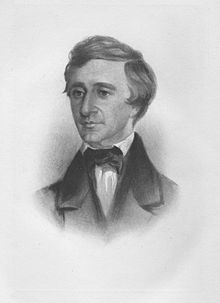Cavazos Sp2010
KCavazos7

|
Transcendentalism does not seem to be a word that can be defined as simply black or white. This is because of the complexity of all the different thoughts that could come from it. It was meant almost to teach people to come to their own beliefs, and most importantly to focus on things less materialistic. This particular movement influenced some of the great American Literature that we learn about today. One author in particular was heavily inspired by this new thought process, especially with having Emerson almost as his mentor. Henry David Thoreau seemed to be born for Transcendentalism and this is shown through out his work. One of his most notable works “Walden” is stemmed from an experiment in simpler living, which only defines Thoreau as the nature loving transcendentalist that he was, by being inspired by this and ultimately inspiring others later in time. |
|
This article goes deeper into Thoreau and Emerson's relationship. It discusses strains forming after the failure of "A Week on the Concord and Merrimak Rivers". There seemed to be tension because there was this underlying feeling of "indebtedness" to Emerson for supporting his endeavor with this last book. So in a unique way, Thoreau in his mind makes this up by building up Emerson in his talk of nature in Walden.
|

|
|
This article written by Laurie Champion
explains the influence writer Bobbie Ann Mason had when writing Clear Springs.
This influence for the book was Thoreau, there are numerous connections with
how she sees the world, and this "journey" somehow correlates with Walden.
This review also notes how this was a spiritual journey for Mason, and sees
this as a way of discovering herself and where she wanted to be. This story is
seen as time for reflection as Walden could be viewed like this as well. |
|
Emerson and Thoreau had a relationship where both seemed to influence each other. Thoreau may have even had a whole different way of thinking had he not had Emerson in his life. So as it looks that Thoreau may have lived in his shadow, it is not he who is paying the complements when their journals are read. And as for the compliments being payed back the flattery just doesn't seem to be as mutual for Thoreau.
|
|
Thoreau was able to aid other lovers of
nature in many ways after his death. An unique article discusses just this,
when one person wanted to recently study the affects that global warming would
play on nature. Trying to hunt back data to compare plant blossoming patterns,
his best resource was that of Thoreaus data, data that was only available
because of his love for nature and his close observance. |
|
Even though Walden seems to be interpreted very straight forward, to the unknown of certain knowledge their are certain moments that may seem to be meant as one thing but really reveal more to get from it. Raymond Benoit closes in on this thought when referring to chapter 9 in Walden when Thoreau refers to this pond as "God's Drop". He states that this meaning is hidden to anyone with out knowledge to the Hindu concept of Bindu.
|

|
It may be a misconception to think of Thoreau as someone who would hunt because of his love for nature. But for him, this topic was a something that he was actually on the fence about. This article takes a deeper look into this subject and Thoreau's feelings on it by looking at journals and writings from him.
|




